 Petzlover
Petzlover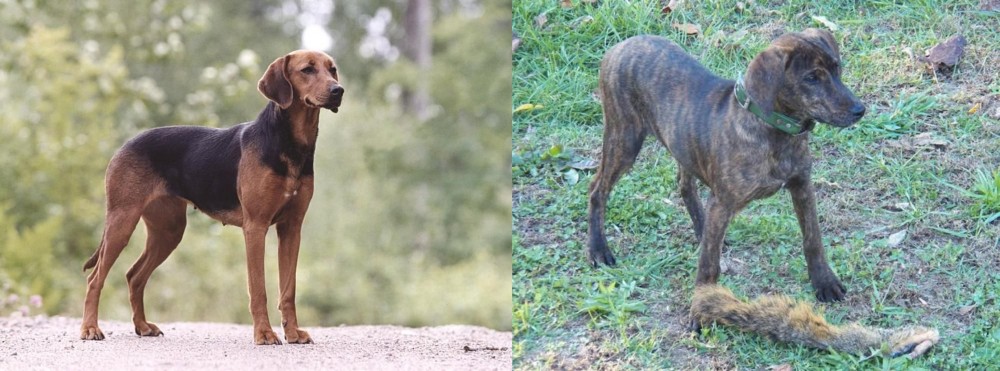 Schillerstovare is originated from Sweden but Treeing Cur is originated from United States. Both Schillerstovare and Treeing Cur are of same height. Both Schillerstovare and Treeing Cur are having almost same weight. Schillerstovare may live 3 years more than Treeing Cur. Both Schillerstovare and Treeing Cur has almost same litter size. Both Schillerstovare and Treeing Cur requires Low Maintenance.
Schillerstovare is originated from Sweden but Treeing Cur is originated from United States. Both Schillerstovare and Treeing Cur are of same height. Both Schillerstovare and Treeing Cur are having almost same weight. Schillerstovare may live 3 years more than Treeing Cur. Both Schillerstovare and Treeing Cur has almost same litter size. Both Schillerstovare and Treeing Cur requires Low Maintenance.
 The Schillerstövare originated in Sweden, being named after a Swedish farmer, Per Schiller. After he died, the dog was named Schillerstövare in 1907, and was Sweden's first native dog breed.
The Schillerstövare originated in Sweden, being named after a Swedish farmer, Per Schiller. After he died, the dog was named Schillerstövare in 1907, and was Sweden's first native dog breed.
The Swedish Kennel Club recognised this dog in 1907 and it is also recognised by the Federation Cynologique Internationale as well as a number of minor kennels and dog clubs.
The dog has always been used as a hunting dog and the English Foxhound is the e foundation for this breed.
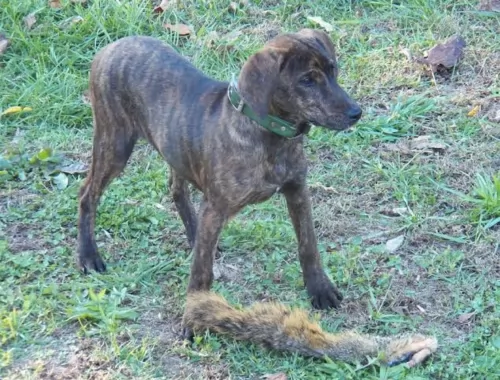 The Treeing Cur dog is a mixed-breed, working dog which hails from the USA and recognized by the United Kennel Club in November 1998.
The Treeing Cur dog is a mixed-breed, working dog which hails from the USA and recognized by the United Kennel Club in November 1998.
They’ve always been used to tree animals such as squirrels, raccoons, bears, and even mountain lions. They were developed to be used as hunting and guarding dogs.
Aside from these good qualities, today the dog makes an excellent family companion.
 The Schillerstövare is a medium to large sized dog. They’re athletic and muscular.
The Schillerstövare is a medium to large sized dog. They’re athletic and muscular.
Standing at between 53–61cm in height and weighing in the region of 18–25kg, the coat of the dog is fairly short and harsh, with the color being black and tan.Sometimes you’ll see some white markings on the chest and paws.
The head is domed, the eyes brown, bright and alert and the ears of the dog are broad, medium length and floppy. The long tail is carried low or held out when running or alert.
If you allow your Schillerstovare to have puppies, you can expect between 3 to 7.
The Schillerstovare is a calm dog but he can get petty lively when there’s a game to be had. He gets on well with well disciplined children who have been taught to be kind and respectful to animals. He also gets on well with pets in the home. Just like with most other dogs, he will need to be trained and socialized as he is a strong willed, confident, dominant dog.
He is friendly and active but will be somewhat reserved around strangers.These dogs will require a lot of exercise and will need quite a bit of space too. They aren't well suited to small properties in the city. He will need a daily walk but also a chance to get off his leash and run free in the park. Other forms of exercise such as hikes, ball game and swimming will delight him.
 Standing at between 46 – 61cm in height and weighing between 14 – 27kg, the medium-sized Treeing Cur is athletic and muscular.
Standing at between 46 – 61cm in height and weighing between 14 – 27kg, the medium-sized Treeing Cur is athletic and muscular.
He has a short to medium-length double coat that can be in a number of colors. Red and white, tan and white, black and white, brindle, some freckling and bi-colored or tri-colored.
The eyes are mostly brown but can be green or blue too. They’re well-muscled and robust and have medium length floppy ears. The tail is mostly docked but is sometimes left long.
These dogs are alert and intelligent, being easy to train and wanting to please their owners, getting along well with all members of the family, including children and other dogs.
They’re strong-willed dogs and will require training and socialization if you want them to be well behaved wherever they are. He is intelligent so there won’t be any trouble with training him. He is very responsive to what his owner requires of him, with a desire to make their owners pleased with them.
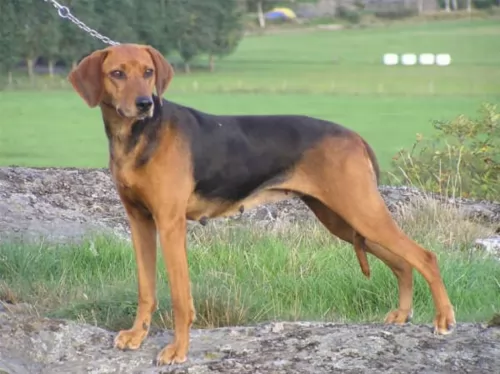 Schillerstovares are social, loving, friendly, loyal dogs who enjoy being around their human family. He’s going to need a lot of exercise, both mental and physical to keep him from boredom and frustration.
Schillerstovares are social, loving, friendly, loyal dogs who enjoy being around their human family. He’s going to need a lot of exercise, both mental and physical to keep him from boredom and frustration.
He will rely on you for at least a daily walk. He is strong-will and confident and will do well in a family where they are active and where they are firm, patient, kind and consistent in their behaviour towards him because then he ticks all th right boxes for being a splendid pet.
 The Treeing Cur is a working dog that loves all the action. He is an alert, intelligent dog, and being territorial and protective, he makes an excellent guardian dog too.
The Treeing Cur is a working dog that loves all the action. He is an alert, intelligent dog, and being territorial and protective, he makes an excellent guardian dog too.
They can show some aggression towards strangers and other dogs they don’t know. Apart from being an excellent hunting dog, the Treeing Cur loves to be around their human family, making loyal and loving companions.
 Even though your Schillerstovare is a healthy dog breed, hip dysplasia is a common dog disease that many dogs get.
Even though your Schillerstovare is a healthy dog breed, hip dysplasia is a common dog disease that many dogs get.
This is a skeletal disease when a dog’s hip joints become partially dislocated. It can be very difficult for your dog to get around, and he can also develop arthritis. It gets very sad when your dog doesn’t even want to participate in games anymore.
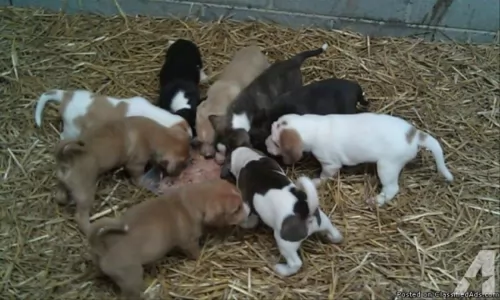 These dogs are very healthy and you’re not likely to have many vet bills when you bring one into your home.
These dogs are very healthy and you’re not likely to have many vet bills when you bring one into your home.
The Treeing Cur has floppy ears, and particularly if it's a dog that loves swimming, it will battle with moisture in the ears. Dogs with floppy ears don’t have good air-flow inside the ears like a dog with erect ears would have. This means that the dog is prone to ear infections.
This is such a common dog illness that can strike even young dogs. That is why it is important to check your dog over regularly for lumps and bumps on the body. Age increases the risk of cancer, so if you feel an unusual lump on your Treeing Cur, better to have your dog checked out at the vet.
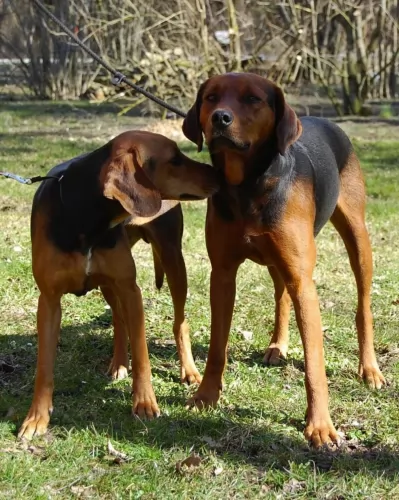 With his short coat, the Schillerstovare is considered a low maintenance dog and requires a minimal amount of grooming. Brushing should be done twice a week to remove loose hair. The harsh outer coat seems to repel dirt and dust.
With his short coat, the Schillerstovare is considered a low maintenance dog and requires a minimal amount of grooming. Brushing should be done twice a week to remove loose hair. The harsh outer coat seems to repel dirt and dust.
Trim your pet’s nails, check inside his ears for signs of redness, make sure his eyes are bright and clear and make sure he doesn’t have any unusual lumps on him.
Make sure his vaccines are up to date to avoid deadly canine diseases. Take him to the vet when you suspect he isn’t his normal self.
Dogs, just like humans, do well on good, nutritious diets. Feed a human lots of junk food and sweets and they’ll grow up to be obese and unhealthy. That's exactly how it is with dogs too. Some of the best commercially manufactured dog foods are convenient and they can be good if you look at the top brands. Look for ones that cater for your dog’s age, size, breed and activity levels. This dry kibble can be made more inviting for your pet when you include some homemade food.
Dogs just want simplicity so that they don’t battle with digestive problems. Boiled chicken, sweet potatoes, brown rice or pasta, carrots and spinach will be wonderful for him when you chop the food up and add it into the dry kibble twice a week. See his tail wag and his brown eyes light up when he smells this treat. Some raw meat added up occasionally will also contribute to your pet’s heath.
Make sure he is never without a constant supply of fresh, cool water.
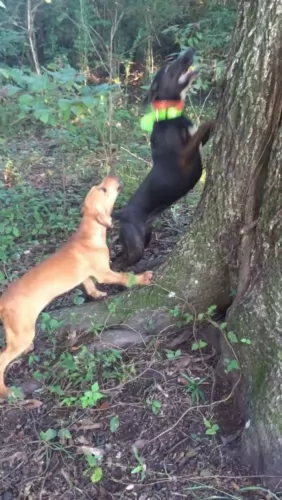 Being an energetic working dog, this dog isn’t going to be content to be lying around. He is going to need regular exercise. He loves a brisk walk or even a run next to you when you go cycling.
Being an energetic working dog, this dog isn’t going to be content to be lying around. He is going to need regular exercise. He loves a brisk walk or even a run next to you when you go cycling.
When at home, you can consider ball games and hide and seek games with him. They just love to run, and if you live near a park, he will want to be off the leash if possible for some free running and sniffing around.
The short coat of the Treeing Cur will do well with a brush twice a week. While you brush your dog, check him out for ticks and fleas. Also, check him over for any unusual lumps.
Part of his grooming should be to check inside his ears for signs of redness, to make sure his eyes are nice and bright still and to see if he will let you look inside his mouth for bad teeth. Bad teeth can be a source of pain for him.
Caring for your Treeing Cur in a responsible manner means ensuring good food. Such an active dog will require proper nutrients so as to meet his energy and health needs.
Your Treeing Cur will need a high-quality commercially manufactured dog food for active dogs and they will also benefit from other simple cooked foods such as boiled chicken, brown rice and vegetables. The habit of feeding your Treeing Cur human foods such as chocolates, popcorn, peanuts, onions and spices could cause digestive upsets and possible vet fees.